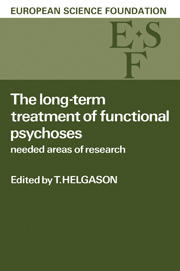Book contents
- Frontmatter
- Contents
- List of Participants
- Introduction
- I Organisational Aspects of Long-term Treatment
- II Patients Aspects of Long-term Treatment
- Needed are as of research in psychological treatments for functional psychoses
- Family therapy as part of the treatment of schizophrenia
- Milieu therapy in the long-term treatment offunctional psychoses: needed areas of research
- Long-term treatment of functional psychosis with neuroleptics
- Lithium and prophylaxis in manic-depressive illness
- New perspectives in psychopharmacology
- Research implications of recent trends in the treatment of schizophrenia
- Long-term treatment of functional psychoses in childhood and adolescence
- Functional psychosis in old age
- Chronicity and hospitalization: can the viciouscirclesbe broken?
- Social network and the long-term course of mental disorders - research needs
- III Public Health Aspectsof Long-term Treatment
- Index
Needed are as of research in psychological treatments for functional psychoses
from II - Patients Aspects of Long-term Treatment
- Frontmatter
- Contents
- List of Participants
- Introduction
- I Organisational Aspects of Long-term Treatment
- II Patients Aspects of Long-term Treatment
- Needed are as of research in psychological treatments for functional psychoses
- Family therapy as part of the treatment of schizophrenia
- Milieu therapy in the long-term treatment offunctional psychoses: needed areas of research
- Long-term treatment of functional psychosis with neuroleptics
- Lithium and prophylaxis in manic-depressive illness
- New perspectives in psychopharmacology
- Research implications of recent trends in the treatment of schizophrenia
- Long-term treatment of functional psychoses in childhood and adolescence
- Functional psychosis in old age
- Chronicity and hospitalization: can the viciouscirclesbe broken?
- Social network and the long-term course of mental disorders - research needs
- III Public Health Aspectsof Long-term Treatment
- Index
Summary
Interest in psychotherapy of the psychoses has waxed and waned. Freud (1953a, b, c) disagreed with Bleuler (1912) and lung (1972) in their suggesting an organic aetiology of schizophrenia although he conceded that such a view did not exclude his own libido theory. Nevertheless Freud considered psychoses unsuitable for his new treatment.
Psychoses, states of confusion and deeply-rooted (I might say toxic) depression are therefore not suitable for psycho-analysis; at least not for the method as it has been practised up to the present. I do not regard it as by any means impossible that by suitable changes in the method we may succeed in advancing beyond these hindrances - and so be able to initiate a psychotherapy of the psychoses. (Freud, 1953c)
Indeed during the years of high psychotherapeutic optimism, and preceding the widespread understanding and application of antipsychotic medication, considerable advances were made in intensive psychotherapy with schizophrenia, e.g. Fromm-Reichmann (1950) and Arieti (1955). Nevertheless during the past few decades psychotherapy has fallen into considerable decline as an important component in the long-term treatment of functional psychoses. Indeed the feelinghas grown up that psychotherapy in these patients has negligible or even harmful effects. More often it is ignored as a treatment in this context (Wing & Wing, 1982).There has been a considerable renewal of interest in studying the effectiveness and efficiency of psychological treatments in psychiatry (Strupp & Bergin, 1969; Malan, 1973; Daly, 1981). In fact London & Klerman (1982) have made a plea for the urgent setting up of a national body in the United States, similar to the Food and Drugs Administration, to evaluate and regulate psychotherapies. They point out that psychotherapy costs in the United States are in excess of $1000000000, comparable with the expenditure on pharmacological treatments. In my own Health Board, the costs of paying personnel in mental hospitals exceeds the bill for medications by a large factor. Thus there surely is considerable justification for examining what these expensive personnel do and say during their encounters with schizophrenic patients, and what effect this mayor may not have on the course of the illness of those suffering from chronic psychoses.
- Type
- Chapter
- Information
- The Long-Term Treatment of Functional PsychosesNeeded Areas of Research, pp. 59 - 76Publisher: Cambridge University PressPrint publication year: 1985

